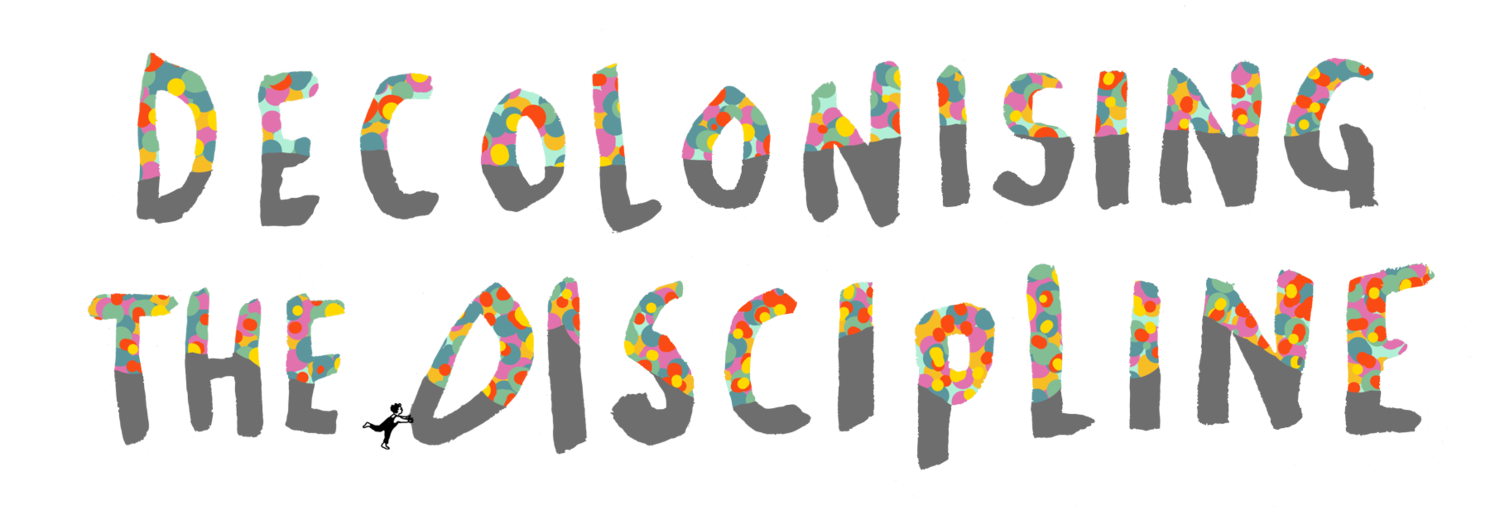Decolonising Research Roundtable
Welcome to the new Decolonising the Discipline blog. To start things off, Katherine Baxter introduces our latest network event, an online roundtable hosted by the Institute of English Studies:
Is ‘decolonising’ the right word for what we do? This is the provocation with which Lara Atkin opened the latest Decolonising the Discipline online roundtable, which was focused on research. Drawing on Tuck and Yang’s essay, ‘Decolonization is not a metaphor’, Lara argued that much activity that is undertaken under the heading of ‘decolonisation’ is rather ‘diversification’. She proposed that it is only when our research results in material benefit to indigenous subjects of colonialism that it can rightly be called ‘decolonisation.’
Éadaoin Agnew expanded on Lara’s provocation to characterise her own work as anti-colonial rather than decolonial. Éadaoin works on nineteenth-century literature with a focus on transnationalism and the Indian subcontinent. She suggested that Swami Vivekananda’s emphasis on knowing through being is a productive lesson for us in decentring post-Enlightenment understanding of knowledge creation. Expanding the possibilities of how we know can work anti-colonially by recognising non-European knowledge systems.
Éadaoin’s interest in decentring was picked up in the next provocation by Shazia Jagot. Using the case study of Hasan Ibn al-Haytham’s appearance in Chaucer, Shazia argued persuasively that the currency of Arabic in medieval Europe, including the British Isles, was ignored in later scholarship because of the blind spots of that scholarship’s colonial critical gaze. In her work Shazia aims to reconfigure contemporary assumptions about medieval cultural reference points and to make visible the presence of non-European interlocutors such as Hasan Ibn al-Haytham.
Alexandra Kingston-Reese built upon these prior provocations about how we know, and where we know from (borrowing from Eugenia Zuroski), suggesting that the essay provides a valuable site for undoing European traditions of knowing, despite the essay’s long association with those very traditions. Alexandra proposed that the essay is ‘a form with a seeming lack of method’ and that this lack of method gives it a capacity for both political thinking and political unthinking, not least through its essential process of ‘not knowing yet’.
Nicole King returned us to the underlying concerns of Lara’s original provocation by thinking about the real-world impact of literary representation. Nicole’s research into the adultification of Black childhood in literature and on screen, illuminates how the normalising of adultification through cultural production creates the grounds on which Black childhood is denied and criminalised in civil society, as in the recent case of Child Q in the UK. Once again we were prompted to consider the exclusionary force of certain ways of (not) knowing or acknowledging.
The five provocations certainly did their job and lively conversations emerged in the open discussions that ensued. What I found particularly fascinating about the five presentations was how they made visible the colonial markers of our discipline when we introduce our own scholarship. We are ‘medieval scholars’, ‘postcolonial scholars’, ‘scholars of the Caribbean’ and so on. We trace the outlines of our research against the political cartographies and temporalities of a European imperial inheritance. Even as we work decolonially and/or anti-colonially, these internal borders within our discipline have a tendency to reinscribe the very traditions we are working to undo.
On the one hand, of course, we don’t have to use these models, and yet they are strongly ingrained. Look at most English Literature job ads, or the ways we still tend to periodise and map our modules: ‘Introduction to nineteenth-century American literature’. I’m left therefore with another provocation, and I’d love to know your responses: how might we continue the work of ‘epistemological deconstruction’ proposed in the roundtable when we introduce our work, when we engage students in the classroom, when we advertise a PhD scholarship or job in our departments? And what difference could that make?
References and resources from the roundtable
Keshia N. Abraham and John Woolf Black Victorians: Hidden in History (Duckworth, 2022)
Evelyn Araluen, ‘Resisting the institution’, Overland 227 (Winter 2017) https://overland.org.au/previous-issues/issue-227/feature-evelyn-araluen/ [last accessed 18th March 2023]
Habiba Ibrahim, Black Age: Oceanic Lifespans and the Time of Black Life (NYU Press, 2021)
Shazia Jagot, ‘Chaucer and Ibn al-Haytham (Alhacen): Perspectiva, Arabic Mathematics and Acts of Looking’, Studies in the Age of Chaucer, 44 (2022), 27-61.
Karen Sánchez-Eppler Dependent States: The Child's Part in Nineteenth-Century American Culture (University of Chicago Press, 2005)
Julietta Singh, Unthinking Mastery: Dehumanism and Decolonial Entanglements (Duke University Press, 2018)
Tyler Stovall, White Freedom: The Racial History of an Idea (Princeton University Press, 2021)
Eve Tuck and K. Wayne Yang, 'Decolonization is not a metaphor', Decolonization: Indigeneity Education, & Society, 1.1 (2012), 1-40.
Linda Tuhiwai Smith, Decolonizing Methodologies: Research and Indigenous Peoples (Bloomsbury, 3rd Edition, 2021)
Eugenia Zuroski ‘“Where do you know from?”: An exercise in placing ourselves together in the classroom’ Maifeminism (January 27, 2020) https://maifeminism.com/where-do-you-know-from-an-exercise-in-placing-ourselves-together-in-the-classroom/ [last accessed 18th March 2023]
